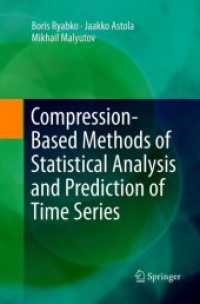- ホーム
- > 洋書
- > 英文書
- > Politics / International Relations
Full Description
Most literature on international arbitration is practice-oriented, technical, and promotional. It is by arbitrators and largely for arbitrators and their clients. Outside analyses by non-participants are still very rare.
This book boldly steps away from this tradition of scholarship to reflect analytically on international arbitration as a form of global governance. It thus contributes to a rapidly growing literature that describes the profound economic, legal, and political transformation in which key governance functions are increasingly exercised by a new constellation that include actors other than national public authorities.
The book brings together leading scholars from law and the social sciences to assess and critically reflect on the significance and implications of international arbitration as a new locus of global private authority. The views predictably diverge. Some see the evolution of these private courts positively as a significant element of an emerging transnational private legal system that gradually evolves according to the needs of market actors without much state interference. Others fear that private courts allow transnational actors to circumvent state regulation and create an illegitimate judicial system that is driven by powerful transnational companies at the expense of collective public interests. Still others accept that these contrasting views serve as useful starting points of an analysis but are too simplistic to adequately understand the complex governance structures that international arbitration courts have been developing over the last two decades.
In sum, this book offers a wide-ranging and up-to-date analytical overview of arguments in a vigorous nascent interdisciplinary debate about arbitration courts and their exercise of private governance power in the transnational realm. This debate is generating fascinating new insights into such central topics as legitimacy, constitutional order and justice beyond classical nation state institutions.
Contents
1. Mapping and Assessing the Rise of International Commercial Arbitration in the Globalization Era: An Introduction ; 2. The Evolution of International Arbitration: Delegation, Judicialization, Governance ; 3. Roles and Role Perceptions of International Arbitrators ; 4. International Arbitration Culture and Global Governance ; 5. Private Justice, Public Policy: The Constitutionalisation of International Commercial Arbitration ; 6. International Commercial Arbitration, Transnational Governance, and the New Constitutionalism ; 7. Does International Commercial Arbitration Provide Efficient Contract Enforcement Institutions for Global Commerce? ; 8. What is the Effect of Commercial Arbitration on Trade? ; 9. The Contested Legitimacy of Investment Arbitration and the Human Rights Ordeal: the Missing Link








